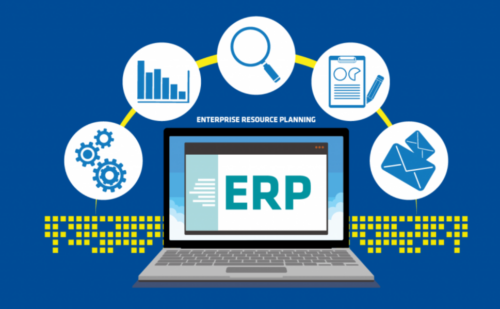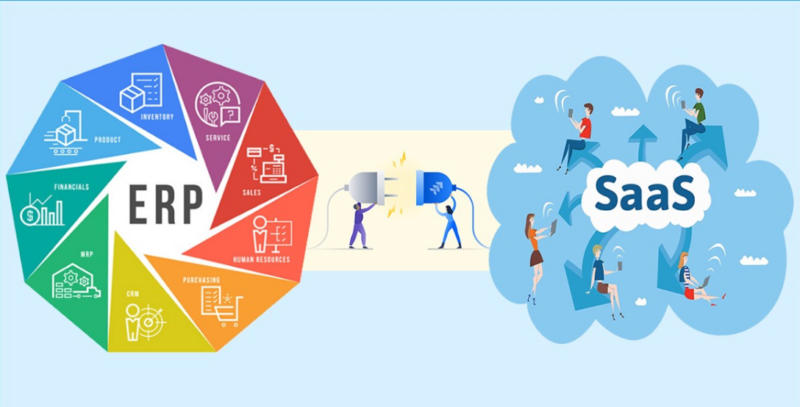Unlock Efficiency with Our ERP Online Solutions – Streamline Operations, Boost Productivity, and Drive Business Growth. Explore Now!
In today’s fast-paced business world, staying ahead of the competition is not just a goal but a necessity. Enterprises of all sizes are constantly seeking tools and strategies to streamline their operations, boost efficiency, and drive growth.
Enter Enterprise Resource Planning (ERP) systems, specifically ERP Online, the secret weapon that has been quietly revolutionizing the way businesses operate and expand.
In the digital age, businesses are constantly seeking ways to optimize their operations. One of the most powerful tools in their arsenal is Enterprise Resource Planning (ERP) software. This article explores the evolution of ERP systems and delves into the benefits of ERP Online, shedding light on why it’s considered a secret weapon behind enterprise growth.
Boosting Productivity: Why Every Business Needs ERP Online
Understanding ERP
ERP is a comprehensive software solution designed to integrate and manage various aspects of a business, including finance, human resources, inventory, customer relationship management (CRM), and more. It provides a unified platform that allows different departments to communicate and share information seamlessly.
Evolution of ERP Systems
ERP systems have come a long way since their inception. Initially, they were primarily on-premises solutions, but with advancements in technology, cloud-based ERP Online systems have become the new norm. This shift has brought about a multitude of advantages for businesses.
Enterprise Resource Planning (ERP) systems have witnessed a remarkable evolution over the years, transforming from basic on-premises solutions into sophisticated cloud-based platforms that drive efficiency and innovation in businesses. This evolution reflects the changing landscape of technology and the growing demands of modern enterprises.
– From On-Premises to Cloud-Based Solutions
The initial ERP systems were primarily on-premises, meaning they were installed and operated on a company’s in-house servers and computers. While these systems offered centralization of data and processes, they came with several limitations. Maintenance was often cumbersome, and scaling the infrastructure to accommodate business growth required significant investments.
As technology advanced, cloud computing emerged as a game-changer. Cloud-based ERP solutions, also known as ERP Online, took center stage. These systems leverage remote servers and the internet to deliver ERP functionality, making them more accessible, flexible, and cost-effective for businesses of all sizes.
– Real-Time Data and Mobility
Another significant development in ERP evolution is the emphasis on real-time data and mobility. Traditional ERP systems often suffered from data lag, making it challenging for businesses to make timely decisions. In contrast, modern ERP Online solutions provide real-time data access from anywhere with an internet connection. This capability empowers organizations to respond swiftly to changing market conditions and customer needs.
– Customization and Integration
Earlier ERP systems were often rigid, with limited customization options. Today, ERP systems are highly customizable, allowing businesses to tailor the software to their specific needs. Moreover, they offer seamless integration with other business applications, such as CRM, e-commerce platforms, and analytics tools. This integration fosters data flow and collaboration across the organization.
– User-Friendly Interfaces
Usability has become a top priority in ERP system development. Traditional systems were known for their complex and sometimes daunting interfaces. In contrast, modern ERP Online systems feature user-friendly interfaces that are intuitive and easy to navigate. This simplification enhances user adoption and productivity.
– Enhanced Security
With the increasing reliance on the cloud, security has become a paramount concern. Modern ERP Online solutions prioritize robust security measures, including encryption, multi-factor authentication, and regular security audits. These measures ensure the protection of sensitive business data.
– Artificial Intelligence and Analytics
The future of ERP systems lies in artificial intelligence (AI) and advanced analytics. AI-powered ERP can automate routine tasks, provide predictive insights, and enhance decision-making. As machine learning algorithms evolve, ERP systems will become more intelligent, helping businesses optimize their operations and fuel growth.
Benefits of ERP Online
Enhanced Collaboration
ERP Online systems promote collaboration by breaking down silos between departments. With real-time data access, employees across the organization can work together efficiently, leading to improved productivity.
Efficiency and Automation
Automation is a key feature of ERP Online. Repetitive tasks are automated, reducing human error and allowing employees to focus on more strategic activities. This efficiency translates to cost savings and better resource allocation.
Data-Driven Decision-Making
In the era of big data, ERP Online systems offer powerful analytics tools. Businesses can make informed decisions based on real-time data, helping them respond swiftly to market changes and customer demands.
Scalability
One of the standout advantages of ERP Online is its scalability. As businesses grow, the system can easily adapt to increased demands, making it suitable for startups and large enterprises alike.
Cost-Efficiency
Cloud-based ERP solutions eliminate the need for significant upfront investments in hardware and software. This cost-efficiency makes ERP accessible to a broader range of businesses.
Challenges of ERP Implementation
While the benefits are undeniable, ERP implementation can be challenging. It requires careful planning, data migration, and employee training. Overcoming these challenges is crucial for successful ERP adoption.
Selecting the Right ERP Solution
Choosing the right ERP system is a critical decision. Factors such as business size, industry, and specific requirements should all be considered. Tailoring the solution to your organization’s needs is essential for reaping the full benefits.
Case Studies
To illustrate the impact of ERP Online, let’s take a look at a few real-world examples of businesses that have experienced significant growth after implementing these systems.
Future of ERP Online
The future of ERP Online is promising. With ongoing advancements in artificial intelligence, machine learning, and data analytics, ERP systems will become even more intelligent and adaptable, driving further growth for enterprises.
The future of Enterprise Resource Planning (ERP) Online systems is poised to be both exciting and transformative, as technology continues to advance and businesses seek ever more efficient ways to operate. Here’s a glimpse into what lies ahead for ERP Online:
1. Advanced Artificial Intelligence (AI)
Artificial intelligence is set to play a pivotal role in the evolution of ERP Online systems. Machine learning algorithms will become even more sophisticated, allowing ERP systems to analyze data patterns, predict outcomes, and automate routine tasks with a high degree of accuracy. This will not only boost efficiency but also enable organizations to make data-driven decisions in real-time.
2. Enhanced User Experience
The future of ERP Online will prioritize user experience. Expect to see ERP systems with highly intuitive interfaces, personalization features, and seamless navigation. User-centric design will be at the forefront, ensuring that employees across all levels can easily interact with the system, leading to increased productivity and satisfaction.
3. IoT Integration
The Internet of Things (IoT) is set to have a significant impact on ERP systems. Integrating ERP with IoT devices and sensors will provide businesses with real-time insights into their operations. For example, manufacturers can monitor equipment performance, track inventory in real-time, and predict maintenance needs. This connectivity will further optimize processes and reduce operational costs.
4. Blockchain for Transparency
Blockchain technology will enhance the transparency and security of ERP systems. It can be used to create immutable records of transactions, ensuring data integrity and traceability. This is particularly valuable in supply chain management, where end-to-end visibility is crucial for efficiency and trust.
5. Cloud Continues to Dominate
Cloud-based ERP solutions will remain the go-to choice for businesses of all sizes. The scalability, accessibility, and cost-effectiveness of the cloud align perfectly with the evolving needs of enterprises. The cloud also facilitates easier updates and maintenance, ensuring that ERP systems stay current with the latest features and security measures.
6. Integration with Ecosystems
ERP Online systems will increasingly integrate with broader business ecosystems. This means seamless connectivity with third-party applications, suppliers, customers, and partners. Data sharing will become more streamlined, enabling businesses to respond rapidly to market changes and collaborate effectively.
7. Sustainability and Green ERP
As environmental concerns grow, ERP systems will incorporate sustainability features. Green ERP will help businesses monitor and reduce their carbon footprint, manage energy usage, and make eco-friendly supply chain decisions. Sustainability reporting will become an integral part of ERP functionality.
8. Predictive Analytics for Strategic Planning
Predictive analytics will not only offer insights into historical data but also help businesses foresee future trends and challenges. ERP systems will assist in strategic planning by providing actionable forecasts, enabling companies to proactively adapt to market shifts.
FAQs
1. Is ERP Online suitable for small businesses?
Yes, ERP Online can be scaled to fit the needs and budgets of small businesses, making it a viable option for growth.
2. How long does it typically take to implement an ERP system?
The timeline for ERP implementation varies depending on the complexity of the project but can range from several months to over a year.
3. What are the security measures in place for cloud-based ERP systems?
Cloud-based ERP providers employ robust security measures, including encryption, access controls, and regular security audits to protect data.
4. Can ERP systems integrate with other third-party software?
Yes, most ERP systems offer integration capabilities to connect with other software applications used by the business.
5. What cost savings can a business expect after implementing ERP Online?
Cost savings can vary, but businesses often see reductions in operational costs, inventory carrying costs, and improved resource allocation.
Incorporating ERP Online into your business operations is not just a strategic move; it’s a competitive advantage that can fuel growth and success. Don’t miss out on the benefits that this secret weapon can offer to your enterprise.
Conclusion
In conclusion, ERP Online has emerged as a secret weapon behind enterprise growth. Its ability to enhance collaboration, streamline operations, and enable data-driven decision-making makes it an invaluable asset for businesses of all sizes.


